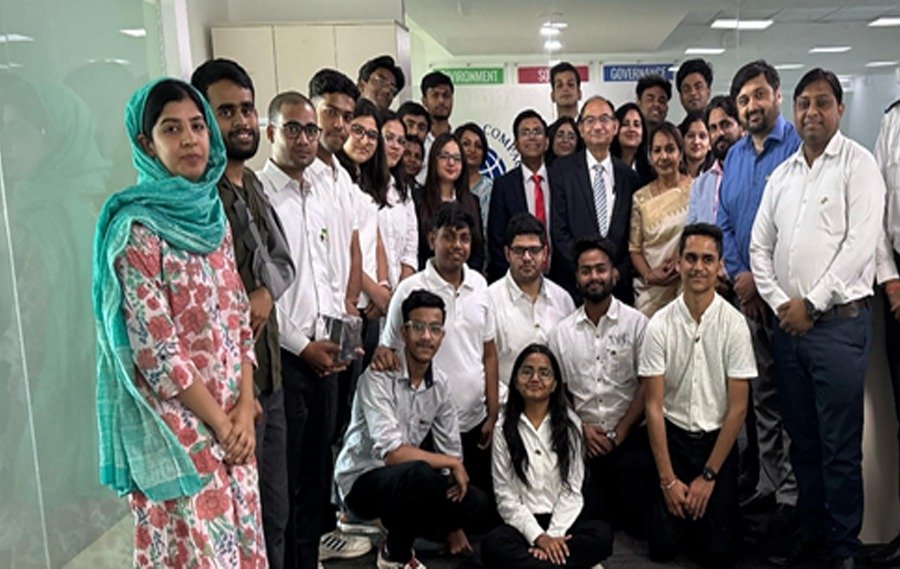
April 21, 2025 — Marking World Health Day 2025 under the global theme “Collective Action for Better Health Across Society,” the United Nations Global Compact Network India (UN GCNI), in collaboration with IEEE Delhi SIGHT, convened a dynamic multi-stakeholder event that brought together voices from government, industry, academia, civil society, and local communities. The event championed the vision of health as a shared responsibility and emphasized cross-sectoral collaboration for advancing sustainable, transparent, and value-based healthcare in India.

Spearheading the discussions was Dr. Somnath Singh, Deputy Director at UN GCNI, who played a pivotal role in bringing together stakeholders from various sectors and aligning the event with the broader agenda of the Sustainable Development Goals (SDGs).
In opening remarks, Dr. Singh emphasized that “health must be viewed as an interconnected issue—linked to water, energy, infrastructure, environment, and equity. It is only through collective action that we can transform today’s inspiration into tomorrow’s impact.” His call for unity across sectors became a recurring message throughout the day’s deliberations.
The event witnessed active participation from over 150 attendees, including students from engineering colleges and schools, healthcare professionals, corporate leaders, academic experts, and grassroots community representatives such as domestic workers, tea vendors, security guards, and women health ambassadors from underserved urban areas. This diverse participation underscored the true spirit of the theme and made the platform genuinely inclusive.

The event began with a keynote address by Shri C.M. Bhandari, Retired Ambassador, who spoke about the transformative power of small, consistent lifestyle changes. “Wellness is built on daily choices—what we eat, how we think, and how we act. Let us each become ambassadors of our well-being,” he urged the audience, particularly inspiring the youth.
Dr. K. Madan Gopal, Advisor at the National Health Systems Resource Centre (NHSRC), Ministry of Health and Family Welfare, delivered an insightful policy perspective. He highlighted the government’s roadmap toward Universal Health Coverage and emphasized that sustained health outcomes require decentralized and community-led implementation models.
Adding a corporate perspective, Mr. R.K. Singh, Head of Electric Vehicles at Tata Power, emphasized how corporate sustainability initiatives intersect with public health goals. “A healthy environment is foundational to a healthy society,” he noted, sharing examples of Tata Power’s community health interventions under their CSR mandate.
Representing the IEEE Delhi SIGHT, Mr. Ravindra Joshi, Past Chair, stressed the transformative role of young engineers and technology in health innovation. “Technology for humanity is not just a slogan—it’s a responsibility,” he said, encouraging youth to contribute small but impactful health solutions.
In the domain of education, Mr. Vijay Shukla, Director at GIMS, highlighted the need to incorporate public health awareness in academic institutions. “Students must learn not just to excel, but to live well,” he said, advocating for a culture of well-being in campus ecosystems.
From civil society, Mrs. Vallari Srivastava, Founder of INU Pulak Foundation, spoke passionately about grassroots health interventions and the power of empathy and cultural sensitivity in serving marginalized communities. “Trust is our first medicine,” she affirmed.
Mrs. Jyoti Sahu, a yoga and wellness expert, added a vital holistic lens by encouraging mindfulness, movement, and nutritional balance as everyday tools for mental and physical well-being. “Wellness is not a luxury—it’s a necessity,” she reminded the audience.
To enhance engagement, Mr. Vikas Gupta from Agile Consultancy used multimedia storytelling to convey powerful health messages, while Ms. Anamika ensured the program flowed smoothly, weaving together various segments and speaker interactions.
Interactive activities like the Health Awareness Quiz and Feedback Circle saw enthusiastic involvement from all age groups. Participants pledged to adopt healthy habits such as yoga, physical activity, nutritious eating, and clean water consumption, showing a tangible shift toward preventive health consciousness.
The event’s biggest strength lay in the unity it fostered among diverse sectors. Partnerships were strengthened between academia, corporates, government agencies, civil society organizations, and grassroots groups—demonstrating the real potential of collective action. Young volunteers and community members actively contributed, reaffirming that inclusive public health initiatives are not only possible but essential.
In closing remarks, Dr. Somnath Singh reflected on the day’s impact and called for sustained action beyond the event. “Let us continue this journey together and transform insights into meaningful change. Today, we created momentum—now we must carry it forward through stronger partnerships, scalable models, and people-led campaigns,” he concluded.
As World Health Day 2025 came to a close, it left behind a powerful message: that advancing public health in India requires not just policy or technology, but the collective will of all sectors, working in tandem to build a healthier, more equitable future.



















